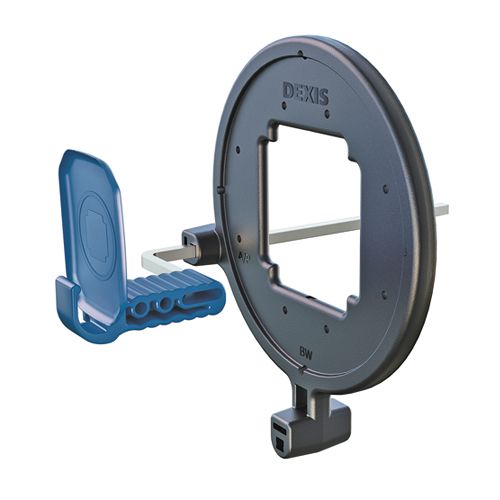I Use That: DEXIS DEXshield
In this installment of “I Use That,” we asked Dr. Jeffrey Dalin and his dental assistant Janet Eaton about their use of the new DEXIS DEXshield. The staff at Dalin Dental Associates in St. Louis has used the technology since it was introduced earlier this year and is quite happy with the results.
In this installment of “I Use That,” we asked Dr. Jeffrey Dalin and his dental assistant Janet Eaton about their use of the new DEXIS DEXshield. The staff at Dalin Dental Associates in St. Louis has used the technology since it was introduced earlier this year and is quite happy with the results.
Trending Article: Why eight different dentists chose eight different handpieces
What the dentist (Dr. Dalin) says about DEXshield
I have had DEXshield for about four months; I got it right after it came out. It is a new radiation-reducing technology from DEXIS. We have two DEXIS Platinum sensors in our office, and I got a DEXshield for each one. Based on my own personal experience, I found that radiation exposure to the patient appears to be drastically lowered when we switched to the DEXIS sensor as compared to film.
Now, by adding our DEXshield we have reduced exposure by an additional 30 percent*. In my office, we use it on every single patient, every single time.
DEXshield was very easy to implement. It replaces the positioning ring that came with the system. One ring fits everything, which means we can use it for both bitewings and periapicals. We used to have a few types of positioning rings, but now, we just use the DEXshield. The staff carries it around in our sensor basket.
As soon as I implemented DEXshield, I wanted to share my enthusiasm, and at the same time, send the message to patients that this practice is up-to-date and innovative. Radiation reduction is a hot topic with current and potential patients, and it is important to everyone to know that we are doing our best to reduce exposure when possible. We explain how it works to the patient to show that we care about them. We like to tell them that we’re able to greatly lower radiation from “the olden days” of film. They are very happy that we can do that for them.
We make sure that all our hygienists and certified assistants who take X-rays deliver this information to our patients. If you are going to have a great device like this, you should let them know! It reminds the patient that, as a practice, we are going above and beyond. Patients and parents of patients really appreciate that we have that capability.
What the assistant (Janet) says about DEXshield
We are using DEXshield all the time now, period. None of us would ever go back to film for a variety of reasons. We are all very aware of radiation concerns, as are patients of this practice, so they like the idea that they are getting less radiation exposure. As for our patients, after they hear what DEXshield can do, every single patient says “thank you.” We get a positive response every single time. Who would say, “No, I want more radiation?” I am so happy that we can offer this to patients, and I thank DEXIS for developing this great device!
Click here to read about what DEXshield is and learn more about the featured product.
Trending Article: Learn how to improve your dental marketing ROI
What is DEXshield?
DEXIS is the only company to provide both an intraoral sensor, DEXIS Platinum, and a shielded ring, DEXshield, with the added benefit of dose reduction. In a laboratory setting, DEXshield plus the DEXIS Platinum sensor was determined to reduce dose by at least 30 percent* as compared to the Universal Ring plus the DEXIS Platinum sensor. DEXshield was created to be easier to use than rectangular collimation, both of which were designed to reduce unnecessary dose to the patient. To overcome some of the limitations of rectangular collimation, DEXshield, when properly used with the DEXIS Platinum sensor, allows the operator to easily establish correct positioning and alignment.
*Data on file; Indications For Use at www.dexis.com/IFU
Featured Product
DEXIS® DEXshield™

DEXshield is a unique dental X-ray position indicating device and a patented patient-protective shield. When used in conjunction with the DEXIS® Platinum Sensor, this exciting new device reduces radiation to the patient by at least 30 percent* and aids in proper positioning for image capture.
DEXIS
888-883-3947 | dexis.com
This article originally appeared in the August 2014 issue of Dental Products Report. For information on other upcoming products, click here to subscribe to DPR's newsletter bit.ly/1oJNUaR.
ACTIVA BioACTIVE Bulk Flow Marks Pulpdent’s First Major Product Release in 4 Years
December 12th 2024Next-generation bulk-fill dental restorative raises the standard of care for bulk-fill procedures by providing natural remineralization support, while also overcoming current bulk-fill limitations.